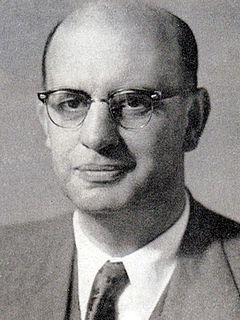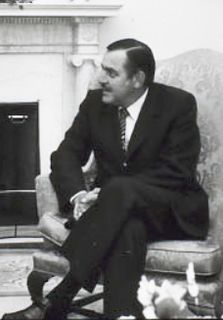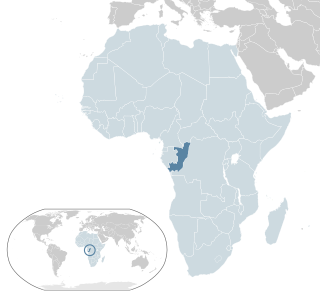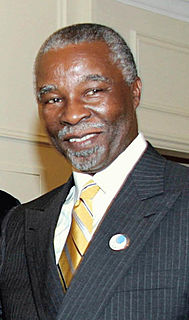Pascal Lissouba is the first democratically elected President of the Republic of the Congo and served from August 31, 1992 to October 15, 1997. He was overthrown by the current President Denis Sassou Nguesso in the 1997 civil war.

Pieter Willem Botha,, commonly known as "P. W." and Die Groot Krokodil, was the leader of South Africa from 1978 to 1989, serving as the last Prime Minister from 1978 to 1984 and the first executive State President from 1984 to 1989.

Roelof Frederik "Pik" Botha, was a South African politician who served as the country's foreign minister in the last years of the apartheid era. He was considered a liberal – at least in comparison to others in the ruling National Party and among the Afrikaner community – but the bulk of his career was spent defending South Africa's apartheid system of racial segregation against foreign criticism.
Azarias Ruberwa Manywa is a Congolese politician, lawyer, and public figure. During the Second Congo War he was a leader of the Rassemblement Congolais pour la Démocratie (RCD-G) rebel group. Following the war he was one of the vice-presidents in the transitional government of the Democratic Republic of the Congo between 2003-2006. He has also been the leader and president of RCD-G's political party since 2003. He is a member of the Banyamulenge community of South Kivu who belong to the Tutsi tribe.
Aziz Pahad is a South African politician, who served as Deputy Minister of Foreign Affairs from 1999-2008, he currently serves as an MP for Johannesburg West Highlands. He is the brother of Essop Pahad.

The Republic of Cabinda was an unrecognized state in southern Africa. The Front for the Liberation of the State of Cabinda-Exercito de Cabinda (FLEC) claims sovereignty from Angola and proclaimed the Republic of Cabinda as an independent country in 1975. The government of this entity operates in exile, with offices located in Paris, France and Pointe Noire, Congo-Brazzaville.

The Republic of the Congo Civil War was the second of two ethnopolitical civil conflicts in the African state of Republic of the Congo, beginning on 5 June 1997 and continuing until 29 December 1999. The war served as the continuation of the civil war of 1993–94 and involved militias representing three political candidates. The conflict ended following the intervention of the Angolan army, which reinstated former president Denis Sassou Nguesso to power.

South Africa since 1994 transitioned from the system of apartheid to one of majority rule. The election of 1994 resulted in a change in government with the African National Congress (ANC) coming to power. The ANC retained power after subsequent elections in 1999, 2004, 2009 and 2014. Children born during this period are known as the born-free generation, and those aged eighteen or older, were able to vote for the first time in 2014.

Brazil–South Africa relations have traditionally been close. Brazil has provided military assistance to South Africa in the form of warfare training and logistics. Bilateral relations between the countries have recently increased, as a result of Brazil's new South-South foreign policy aimed to strengthen integration between the major powers of the developing world.
François Ibovi is a Congolese politician who held a succession of key posts in the government of Congo-Brazzaville beginning in 1997. Closely associated with President Denis Sassou Nguesso, he was Minister of Communication from 1997 to 2002, Minister of Territorial Administration from 2002 to 2007, First Vice-President of the National Assembly from 2007 to 2012, and Minister of Health from 2012 to 2016.
Bernard Bakana Kolélas was a Congolese politician and President of the Congolese Movement for Democracy and Integral Development (MCDDI). Kolélas was a long-time opponent of the single-party rule of the Congolese Labour Party (PCT), and after the introduction of multiparty politics in the early 1990s he was one of Congo-Brazzaville's most important political leaders. He placed second in the August 1992 presidential election, behind Pascal Lissouba; subsequently he was mayor of Brazzaville, the capital, during the mid-1990s, and he briefly served as Prime Minister of Congo-Brazzaville during the 1997 civil war. After rebel forces prevailed in the civil war, he lived in exile for eight years until an amnesty made it possible for him to return; he was then elected to the National Assembly in 2007.

The following outline is provided as an overview of and topical guide to the Republic of the Congo:

Republic of the Congo–Russia relations refers to bilateral foreign relations between the Republic of the Congo and Russia. The Republic of the Congo has an embassy in Moscow. Russia has an embassy in Brazzaville.
Antoine Ndinga Oba was a Congolese diplomat, political figure, and linguist. During the single-party rule of the Congolese Labour Party (PCT), he served in the government of Congo-Brazzaville as Minister of National Education from 1977 to 1984 and as Minister of Foreign Affairs from 1984 to 1991. Later, he was Congo-Brazzaville's Ambassador to UNESCO from 1998 until his death in 2005.

South Africa–Zimbabwe relations have been generally cordial since the end of apartheid in South Africa, although there have been tensions due to political troubles in Zimbabwe in recent years.

Netherlands–South Africa refers to the current and historical relations between the Netherlands and South Africa. Both nations share historic ties and have a long-standing special relationship, partly due to the Dutch colony in the Cape, linguistic similarity between Dutch and Afrikaans and the Netherlands’ staunch support in the struggle against apartheid.

Sahrawi Republic–South Africa relations are the current and historical relations between the Sahrawi Arab Democratic Republic (SADR) in Western Sahara and the Republic of South Africa. Formal diplomatic relations were established at ambassador level in 2004, during the Thabo Mbeki government. A Sahrawi embassy was opened in Pretoria, and the South-African embassy in Algiers was accredited to the SADR.

Jean-Yves Ollivier is a French businessman who works primarily in the commodities sector in emerging markets.



















